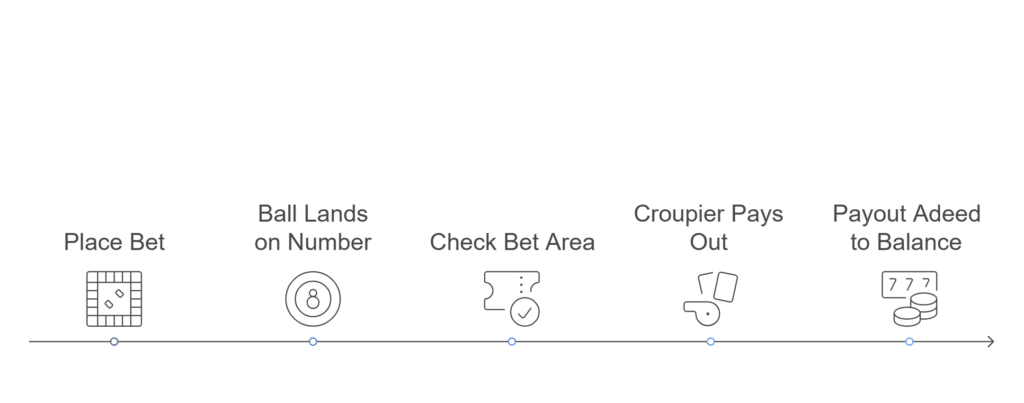
Roulette is an interesting and unique casino game because it offers a huge variety of bet types you can place in the game, most of which present different payout possibilities. The most important part of learning to play this game is understanding the relationship between roulette odds and payouts.
With a solid understanding of roulette payouts and how they work, you can pick the right bets for your game. We’ve compiled a quick guide to roulette to explain how to read a roulette payouts chart and combine different bets based on your knowledge of the potential roulette casino payouts.
What Are Roulette Payouts?

Roulette wheel payouts are awarded if you’ve correctly predicted where the ball will fall in the wheel. This can be done in several ways, and you can win anything from a 1:1 payout (even money) in the game up to a maximum payout of 35:1.
For example, if you bet on the number 12 and the ball falls into that slot, you get a payout of 35:1 for predicting that correctly.
Another example of how payouts in the online roulette game work is betting on all the red numbers on the wheel. This means that whichever number comes up, you’ll win your bet and a payout of 1:1 so long as that number has a red pocket.
How Do Roulette Payouts Work?
Let’s take a closer look at online roulette payouts and what must happen in the game to trigger a roulette payout.
- Roulette table payouts are different for nearly every bet type, so you won’t get the same reward every time you win a round in roulette.
- If the ball lands anywhere you’ve placed a bet on the corresponding area of the roulette table, you’ll get a payout. For example, if the winning number is ’13 black’ and you bet on odd numbers, you win the bet. You’ll also win it if you place a straight bet on the 13, if you bet on black, and so on.
- If your bet is successful, the croupier will give you a number of chips according to your win.
- In online casino roulette payouts are immediately added to your casino balance.

Roulette Payouts Table
The roulette board payouts table below explains all the roulette odds and bets and their relevant payouts, including the correct way to place your chips for each bet. In most cases, you can put just one chip for your bet, depending on the amount you want to bet. Some bets may require multiple chips to cover different areas on the roulette table.
Finally, it should also be noted that you can also combine multiple roulette bets to increase the likelihood of winning a payout. Remember that doing so will also increase your stake, but combining at least two bet types is very common.
| 🎲 Bet Type | 📜 Definition | 💯Payout |
| 👉 Straight Up Bet | Placing a bet on one number on the roulette table. It can also be the number zero. The chip placement for this bet is placing it directly on the number. | 35:1 |
| 👉 Split Bet | Placing a bet on any two numbers adjacent to each other (vertically or horizontally) by placing your chips on the line separating them. | 17:1 |
| 👉 Street Bet | This bet covers a row of any three adjacent numbers of your choice on the roulette table by placing a chip at the outer corner of the top number. | 11:1 |
| 👉 Trio Bet | The trio bet is a three-number bet covering the zero or double zero pocket in American roulette. | 11:1 |
| 👉 Corner Bet | Also called a square bet, this is a four-number bet done by placing a chip at the point where the corners of four numbers meet. | 8:1 |
| 👉 5-Number or Basket Bet | A basket bet is available in American roulette only because it covers the numbers 0, 00, 1, 2, and 3. This is done by placing the chip between the 0, 00, and the 2. | 6:1 |
| 👉 Line Bet | A line or double street bet covers two rows of three numbers (6 numbers in total). Chips are placed on the street’s outer edge of the last two numbers. | 5:1 |
| 👉 Columns Bet | A bet on 12 numbers adjacent horizontally, done by placing your chips on any box marked ‘2:1’. | 2:1 |
| 👉 Dozens Bet | Another 12-number bet covering a different set of numbers, indicated by placing chips on the ‘1st 12′, ‘2nd 12′, or ‘3rd 12′ boxes. | 2:1 |
| 👉 Low/High Numbers Bet | A bet that the winning number will be low (chips placed on the box ‘1-18′) or high (chips placed on the box ’19-36’). | 1:1 |
| 👉 Even or Odd Numbers Bet | A bet on odd or even numbers. Chips can be placed on the area marked ‘odd’ or ‘even’ at the bottom of the roulette table. | 1:1 |
| 👉 Red or Black Numbers Bet | Betting on the colour of the winning numbers, indicated by placing chips on the red or black boxes at the edge of the table. | 1:1 |
How to Calculate Roulette Payouts?

Roulette payouts are always clearly displayed in a payable. If you play roulette at online casinos, this can be easily viewed in the game panel, while land-based casinos sometimes display roulette payouts in a chart on the table.
If you want to calculate roulette payouts, you can easily do so by using your bet size. Payouts are displayed as a ratio of x:1, which means that for every £1 bet, you get x number of pounds if the bet wins.
So, if we take a bet that pays 11:1 as an example, you win £11 with a winning £1 bet. If you bet £10, the payout would be £110 (10×11). You can also use an online roulette payouts calculator, but completing a quick calculation yourself is easy.
FAQs – Frequently Asked Questions about Roulette Payouts
Roulette payout odds vary for every bet type but also depend on the chosen roulette game. European roulette offers more favourable odds, with a house edge of 2.70%, compared to 5.26% on the American roulette wheel.
Outside bets offer the best payout odds in a roulette game, particularly even money bets.
Payouts always depend on the bet and are awarded according to the roulette rules for payouts. For example, if you win a straight bet, you get a payout of 35:1, while a winning dozens bet pays 2:1.
Roulette related articles
The appeal of Roulette for players lies in the fact that it’s an easy game to understand and fun to play. Like most games of chance, there are no complicated rules which leaves straightforward gameplay. What’s unique about roulette is that there are so many betting options, which means the odds of winning roulette are […]
If you know the basic rules and bets in roulette, this classic casino game is one of the easiest and most entertaining ones you can try at Betiton UK. Although bet types are vast in this game, they’re easy to get the hang of with a little practice. If you’re new to the roulette wheel, […]
If you’re a complete roulette beginner, this quick guide will teach you all the basics you need to know to start playing roulette games at an online casino. Our Betiton Casino roulette guide will explain how to play European roulette and American roulette, how to understand the connection between odds and payouts, and the basic […]


